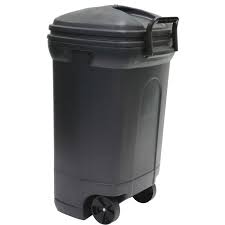Trash and Recycling cans have a certain life expectancy based on several factors such as the manufacturer, material and features of the particular can. Some trash cans can be costly and come with manufacturers warranties if they do not perform over a defined course of time. Residents should save their receipts and contact the can manufacturer if recourse is needed.
features of the particular can. Some trash cans can be costly and come with manufacturers warranties if they do not perform over a defined course of time. Residents should save their receipts and contact the can manufacturer if recourse is needed.
As with any consumer product, trash and recycling cans need to be replaced periodically due to regular use and exposure to weather elements. The most common reasons for a trash or recycling can failing are:
Handle: A handle will fail because the pail is overloaded. Each pail is rated for a maximum weight, and exceeding it will cause the handle to deteriorate and break over time. Articulating/hinged handles fail more frequently because the hinge is a weak point. Built in handles are more durable but will fail after repetitious strain due to an overloaded can.
Bottom: A trash can (with no wheels) bottom will fail from being dragged to and from the curb. Over the course of time, the friction from the pavement will degrade the material and thin out the bottom. Repeated degradation, along with exposure to weather elements will lead to the can bottom breaching.
Lid: Hinged lids are primarily designed for automated collection. During the automated collection process, a mechanical arm extends from the collection vehicle which attaches to the can. The can is then lifted and inverted over the area where the refuse will be deposited in the collection vehicle. Other than the lifting arm, the can never makes physical contact with the vehicle.
The collection process on a manual collection route exposes the lid and hinge to physical contact with the collection personnel and parts of the truck such as the hopper opening. Manual collection, by its very nature, occasionally results in damage to the hinge and/or lid during the routine collection process. As such, the Town shall not be responsible for normal wear and tear to the lids or hinges on these types of cans.
Vehicular Damage: Cans that are left empty on busy roads can be blown on their sides or down the block from the negative air pressure (rear vacuum) created by a passing car. The faster the traffic on a street, the higher the rear vacuum from passing cars makes this likely to happen. Once a can is on its side, and in traffic, vehicular damage is possible. (Round cans are more susceptible to rolling as well)
Please consider the above information before contacting the Town about a damaged trash or recycling can. These items are warrantied and have a specific life expectancy. Any damage that is blamed on the carter must be substantiated by an eye witness and by physical evidence of the can.